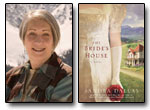The author of several bestsellers, Sandra Dallas knows not to give up when the writing doesn’t flow. She learned this, first and foremost, from her mother --- “giving up wasn’t part of Mom’s makeup.” Though her mother is no longer here to place copies of THE BRIDE’S HOUSE face out on bookstore shelves, Sandra knows that she’s still her biggest fan.
 My mother always claimed that what writing talent I had came from her. After all, as a girl, she’d written a poem that she recited often:
My mother always claimed that what writing talent I had came from her. After all, as a girl, she’d written a poem that she recited often:
In our yard there is a tree
Where birdies come and sing with glee,
Safe from cats and naughty boys
Where they can sing and have their joys.
Not to be outdone, my father also displayed a poetic bent. In fact, I like his childhood poem even better:
In our barn there is a’sittin’
An old gray cat and a little kitten.
So you can see, a fine literary sense runs in my genes. Little surprise that I embraced writing as a career. It began in fifth grade when I won a pair of ice skates on a radio show with a poem I wrote:
Swimming is the sport for me.
It’s more fun than I thought any sport could be.
And on and on in that tortured vein.
Okay, so I started at a deficit. But my parents were enthusiastic about my writing. What else could they have done? I was equally untalented at math, science and the arts. And when I tried out for the school play, my lifelong dream of becoming a movie star was trashed. (I was a success, however, as Happy the Dwarf in my junior high school production of “Snow White,” a talent that has been inherited by my grandson, Forrest, eight, who played Doc in his school production last March.)
After that traumatic school tryout, I went to Plan B, the next closest way to fame and fortune --- writing. Dad lived long enough to see me publish several nonfiction books. But Mom, who died almost 10 years ago, saw my move into fiction and, in fact, inspired one of my early novels, THE PERSIAN PICKLE CLUB. It was based on an incident that occurred when my folks were first married.
In 1933, Dad lost his job, and they moved to his parents’ farm in Kansas. One day, a neighboring farmer offered a day’s work in his fields, and said he’d pay $1. Dad and his brother flipped a coin to see which one got the job. Dad won, and he worked so hard, he finished at noon and was paid just 50 cents. It was the only money he made all summer. Mom didn’t like farm life and announced she was going into Topeka and wasn’t coming back until she got a job, and she did just that. She worked harder than any woman I ever knew. And that example, as much as her encouragement, made me a writer.
She taught me to work hard and not to quit. Quitting is so tempting. You read your favorite author’s work, then read your own and think you’ll never make it as a writer, so why try? But giving up wasn’t part of Mom’s makeup. And she wouldn’t let it be part of mine. So in those days before I was ever published, I’d rip the paper out of the typewriter, but then I’d insert another sheet and try again. I knew Mom wouldn’t understand if I gave up. Those early attempts weren’t very good, but as we all know, you learn to write by writing, and I kept at it.
Mom was my biggest fan. She attended all my signings, ordered my books for the church library she ran, and talked me up to her friends. And of course, she went into bookstores and removed my books from the shelves placing them face out where browsers could see them.
It embarrassed me at the time, but I miss that sleight-of-hand, which thanks to Mom, is still going on. My daughters now sneak into bookshops, take down my books, and shamelessly leave them on the best-seller displays. It’s in the genes.


